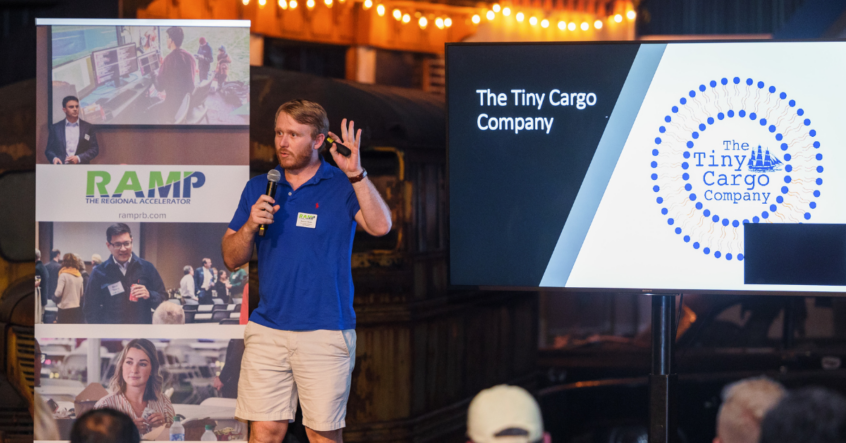Leveraging a $982,443 Build to Scale grant from the U.S. Economic Development Administration (EDA), Verge has significantly impacted the regional innovation ecosystem and helped provide critical support to more than 100 startup companies in the region over the past three years, thanks to the support of Regional Accelerator and Mentoring Program (RAMP).
Verge received the EDA’s Build to Scale grant in October 2020 as part of a $2.08 million, three-year project, which concluded Sept. 30, 2023. Verge used the grant to scale up the Regional Accelerator and Mentoring Program (RAMP) as well as establish new Verge resources and programming for the region.
During the grant period of October 2020-September 2023, RAMP supported the acceleration of 30 startups through seven cohorts of its accelerator-in-residence program. The program provides resources and mentoring for startups in technology and health and life sciences across the GO Virginia Region 2 footprint, including the New River Valley, Roanoke Valley, Alleghany Highlands, and Greater Lynchburg regions.
“These programs provide vital resources and mentoring for technology- and health-based entrepreneurs when they need it most. Verge is proud to be successful with these ongoing efforts to grow the innovation ecosystem and our local economy,” said Verge President Erin Burcham.
Participating companies collectively launched 35 products, created 97 jobs, earned 22 Small Business Innovation Research/Small Business Technology Transfer grants, and raised a total $28.2 million in capital through grants, loans, and private investment.
“The grant funding allowed RAMP to offer a second accelerator cohort the past three years, expanding our mentorship efforts to support the health and life sciences startups that make up an exciting and emerging industry cluster in our region. We are grateful to Verge and the EDA for their support of this important program,” said Sarah Spotswood, managing director for RAMP.
Tiny Cargo Company, which participated in the spring 2021 cohort, notes that the experience in RAMP enabled initial business development activities, and provided the skills needed to appropriately assess the market, develop their product, construct a pitch, and execute with groups ranging from other accelerators, such as JLABS and Blue Knight, to investors.
“Tiny Cargo just successfully closed our first major investment round,” said Spencer Marsh, chief scientific officer for the Tiny Cargo Company. “RAMP was invaluable to Tiny Cargo by providing the tools and honing the skills required during our early-stage growth period that have set the stage for all our success in the last 2 years, as well as that yet to come.”
CytoRecovery learned a lot about their business structure during RAMP, noting that and customer interviews helped them develop and shift sales models; they also got the opportunity to connect with valuable networks that have led to tangible outcomes such as access to capital, grant writing support, and customer leads.
“RAMP is a great place to be involved as a growing business,” said Alex Hyler, PhD, VP and CSO of CytoRecovery. “They have a gravity in the region to connect entrepreneurs to valuable mentors, collaborative environments, and countless networks that may support your business, hiring, technical, or other needs.”
In addition to scaling the accelerator-in-residence program, three key areas were also expanded through the EDA project, including increasing pathways for early-stage startups, enhancing support for later-stage startups and Verge’s ongoing efforts with resource development and research to grow the innovation ecosystem.
For early-stage startups:
- Project partners Fralin Biomedical Research Institute and Virginia Tech’s LINK + LICENSE + LAUNCH offered a wide range of activities, informational sessions, and initiatives to support technology commercialization research efforts and regional entrepreneurship.
- The Fralin Commercialization Fellows Program graduated 12 fellows over the course of the 3-year project, who developed their research commercialization ideas and plans and received RAMP curriculum and training.
- Virginia Tech’s LINK + LICENSE + LAUNCH steadfastly hosted Startup Labs and Tech Transfer Bootcamps to further support research commercialization and contribute to startup pathways in the region.
For later-stage startups:
- Six PitchPlus Clinics offered 55 companies information about capital fundraising and prepared them for early-stage investment opportunities.
- A seven-part Founders & Funders virtual workshop series focused on access to capital served 138 participants during the pandemic.
- RAMP supported 25 startups with post-acceleration support and programming. Thanks to Skyline Capital Strategies, 38 companies total received individual capital consulting support, and the Virginia Innovation Partnership Corporation led three Small Business Innovation Research workshops at RAMP.
Finally, with the support of two GO Virginia grants and EDA Build to Scale grant funds, Verge continued to develop resources supporting the innovation ecosystem like the annual Game Changer Events and building coalitions to advance regional priorities and address gaps in the ecosystem.
The success and completion of this project was made possible thanks to matching resources, contributors, and partners that include GO Virginia, Virginia Innovation Partnership Corporation, Skyline Capital Strategies, Virginia Tech, Fralin Biomedical Research Institute at VTC, City of Roanoke, Virginia Western Community College Educational Foundation, Woods Rogers Vandeventer Black, Virginia BIO, the Virginia Tech Corporate Research Center, and the Verge Alliance, among other program sponsors.
As part of the Verge regional data tracking effort, we were pleased to release annual review reports, as well as data dashboards on the innovation and entrepreneurship landscape of Region 2 of Virginia, with the latest report available here.
A one-page fact sheet on the impact the EDA Build to Scale Grant has made on the regional innovation ecosystem is available for download here.

